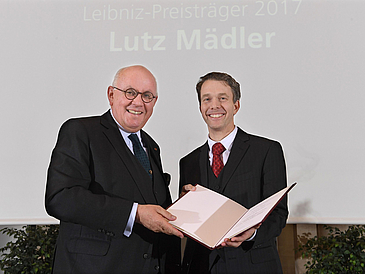At a recently held award ceremony in Berlin, Professor Lutz Mädler received the Gottfried Wilhelm Leibniz Prize 2017 for his ground breaking research on the formation of nanoparticles from the gas phase and their effect on living matter.
Awarded annually by the German Research Foundation since 1986, the Leibniz Prize is generally considered to be the most important science prize worldwide. The prize money, amounting to 2.5 million euro over a seven-year period, can be spent entirely as the winner sees fit for his research.
The effects of nanoparticles on humans
In its grounds for bestowing the prize on Mädler, the German Research Foundation states: “Professor Mädler has developed an improved version of flame spray pyrolysis used in the cost-effective synthesis of nanoparticles. The method involves the thermo-chemical fission of organic compounds. His research has made flame spray pyrolysis feasible in industrial application. Later, Mädler further developed this pyrolysis technique by discovering the droplet explosion phenomenon in flame sprays and its effects on materials synthesis. He was not content, though, simply to promote the customized synthesis of nanoparticles but went on to investigate whether these particles might be harmful to humans. This is especially important because many applications, for example in varnishes, textiles or dental fillings, have direct effects on the human body. Mädler was able to show that interaction of synthetic nanoparticles with biological tissue gives rise to reactive oxygen species that can cause harmful reactions.”
Mädler’s scientific career:
Lutz Mädler first studied Technical Physics at Technische Hochschule Zwickau and later Process Engineering at Technische Universität Bergakademie Freiberg, where he was awarded his doctorate in 1999. After completing his postdoctoral thesis at ETH Zurich, he received a stipend from the German Research Foundation and became a Senior Researcher at the University of California, Los Angeles. In 2008, Mädler was appointed Professor for Process Engineering in the Faculty of Production Engineering. He also leads the Department of Process Engineering belonging to the non-university “Foundation Institute for Materials Science”.

